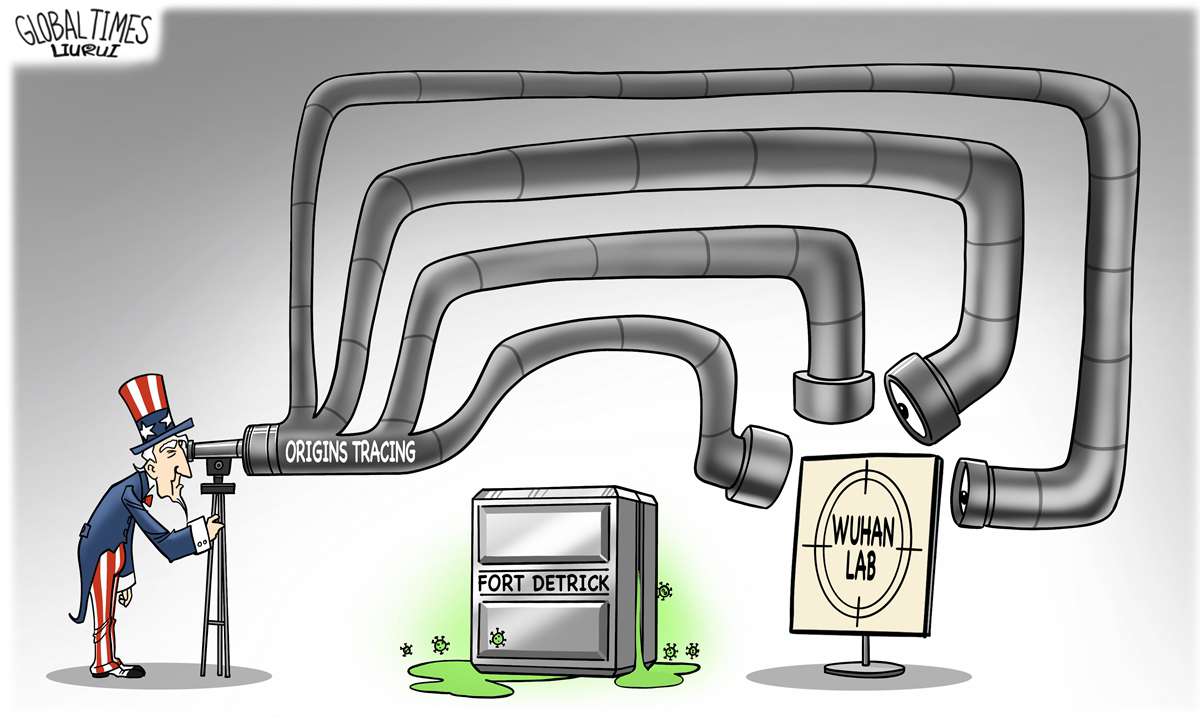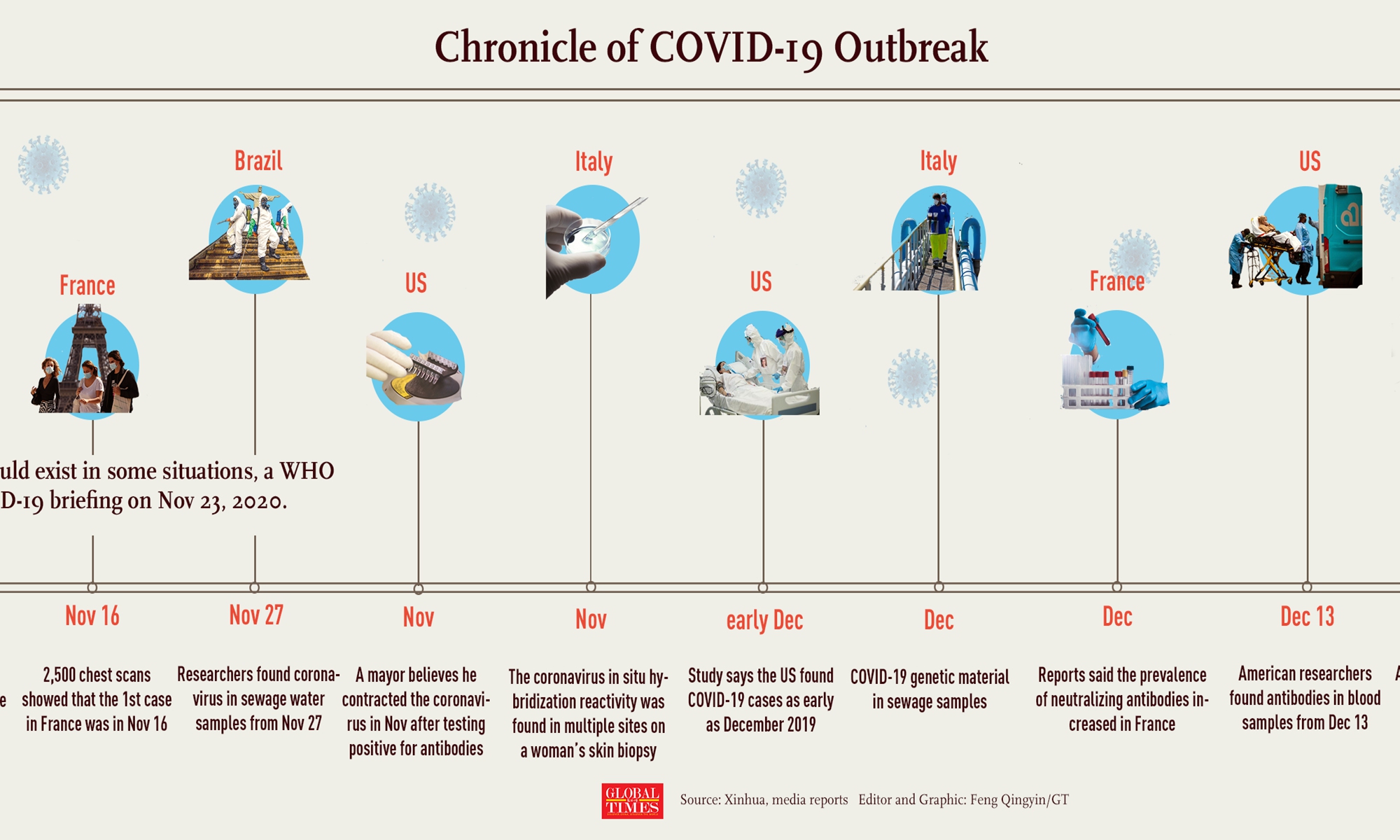China rejects WHO’s phase-2 COVID-19 origins study, calling it ‘lack of respect for common sense, arrogant toward science’

Through the lens. Illustration: Liu Rui/GT
While calling the World Health Organization (WHO)'s second phase study proposal on COVID-19 origins lacking respect to common sense and arrogant to science, Chinese health officials and observers on Thursday said China will not accept such a plan and the next stage study should be carried out in more countries and places around the world on the basis of wide consultations among member states, not in places that have already been inspected.
The WHO's plan was proposed as the US-led West intensifies the politics-driven conspiracy about a "lab-leak" theory and exerted political pressure on international scientists to give up their scientific position on the origins issue. Chinese observers called on the WHO to adhere to science and resist the adverse trend of politicizing the COVID-19 origins issue.
Disgruntled by the US' overt political manipulation and shrugging off international concerns on its biological labs, a group of Chinese netizens drafted an open letter to ask the WHO to investigate the US Army Medical Research Institute of Infectious Diseases (USAMRIID) at Fort Detrick, which has generated more than 7 million signatures in less than six days.
Move on to more countries Zeng Yixin, deputy director of the National Health Commission, said at Thursday's media briefing on COVID-19 origins that China has submitted phase-2 COVID-19 origins-tracing recommendations to the WHO believing the study should be based on the WHO-China joint study in January, and should be carried out in many more places around the world after full consultations with member states.
The WHO on Friday proposed a second phase study into the origins of the coronavirus in China, which includes studies of animal markets in and around Wuhan and audits of relevant labs and research institutions operating in the area of the initial human cases identified in December 2019.
Zeng said that he was "shocked" to read the proposal and he could sense the "lack of respect for common sense and the arrogance to science in the proposal."
"It's impossible for us to accept such a plan," Zeng said, noting that the second phase study should not be carried out in places that have already been inspected in the first phase study, especially places where a clear conclusion has been reached.
Liang Wannian, team leader of the Chinese side of the WHO-China joint expert team on the COVID-19 origins, said at the briefing that we believe that the lab leak theory is highly unlikely, and there is no need to invest more data and resources in that area.
"If some countries believe that further investigation in this area should be carried out, then the investigations should be conducted in labs that have not yet been inspected," Liang said.
Liang told the Global Times at the media briefing that multiple studies in different countries point to the possibility that COVID-19 had surfaced before the cases previously reported.
He listed some examples. An Italian woman's skin biopsy detected genomic sequence of the coronavirus in November 2019. Donated blood check-ups in nine US states found 106 blood samples, ranging from December 13, 2019, to January 17, 2020, that tested positive for coronavirus antibodies.
The long list of scientists' studies indicates that Wuhan might not be the first place of the coronavirus' inception, Liang said.
Zeng said that China hopes the WHO could consider recommendations proposed by Chinese scientists, truly regard the tracing task as a scientific issue, get rid of political interference and promote the origins study in more countries and places around the world.
Renowned scientist in evolutionary biology and genetics Wu Chung-I told the Global Times on Thursday that the novel coronavirus can only come from nature, and cannot be man-made. He called on the WHO and international scientists to seek truth with the spirit of science.
Wu and 20 other Chinese scientists, and one British scholar working in China published an article recently, strongly demonstrating why the novel coronavirus cannot be man-made by using classical evolutionary theory.
Noting some countries led by the US tried to politicize the issue of tracing the origins with the US even directing intelligence agencies to launch a 90-day investigation into China, Wu, a professor at the School of Life Sciences of Sun Yat-sen University in Guangzhou, South China's Guangdong Province and director of the Beijing Institute of Genomics under the Chinese Academy of Sciences, stressed the main reason why the global epidemic is out of control is that the voices of scientists are too weak. If the global response had been scientific and positive, the COVID-19 outbreak would have ended in May last year.
"Is it possible for someone who knows nothing about physics to say something sensible about the origin of the universe?" Wu asked.
Wu said every search has to start with a model, much like a hunt for a crime suspect needs a profile of the hunted (such as height, age, physique). Therefore, the WHO should define what the origins means first before it decides where to go.
"In our model, we have a fairly specific idea where to search for the origins. It would be a place with an abundance of bats, a low density of local humans, and frequent contacts between humans and bats, especially where bats are an important part of the local cuisine," Wu said.
Not just Chinese scientists, some international scientists have expressed the need to visit more countries for origins study.
Marion Koopmans, a WHO-China joint study team member and head of the viroscience department at the Erasmus MC Rotterdam in the Netherlands, told the Global Times previously that the follow-up studies on coronavirus origins should look at regions outside China that have reported "viral sequences very early in 2019," as recommendations in the joint study report called for studies in regions where viruses are almost identical to the first detected viruses from Wuhan, Koopmans said.
She said there is also a need for more surveys of bats, particularly in China's neighboring countries.

Illustration: Liu Rui/GT
Next stop: the US
A group of Chinese netizens drafted an open letter urging the WHO to investigate Fort Detrick, and entrusted the Global Times with posting the letter on WeChat and Weibo on Saturday to solicit a public response.
They said in the letter that to prevent the next epidemic, the WHO should pay special attention to labs that are conducting studies on dangerous viruses or even biochemical weapons. The open letter particularly noted the Fort Detrick lab, which stores the most deadly and infectious viruses in the world, including Ebola, smallpox, SARS, MERS and the novel coronavirus.
After foreign media including Russia's RT reported the open letter, some foreign netizens asked whether the open letter could be signed by foreigners as they believe citizens around the world deserved to know the truth about Fort Detrick.
Some Chinese experts also pointed out that the US should be prioritized for WHO's next stage origins study.
Zeng Guang, a former chief epidemiologist of the Chinese Center for Disease Control and Prevention, told Global Times that the US should be prioritized, as the country was slow to test people at an early stage, and it possesses so many biological laboratories all around the world. "All bio-weapons related subjects that the country has should be subject to scrutiny," Zeng said.
Yang Zhanqiu, a deputy director of the pathogen biology department at Wuhan University, told the Global Times that almost all prevailing coronavirus variants have been discovered in the US. The virologist also called on the US to hand over blood samples of those COVID-19 patients, and disclose more information about the country's epidemiologic survey, to give a clearer picture of the relation between US cases and those of other countries.

Infographic: Feng Qingyin/GT
Doubts about the US will not end
Instead of facing up to world concerns and its own COVID-19 response failure, some US politicians used the COVID-19 origins issue to stigmatize and demonize China to shift the blame, observers said.
White House chief medical adviser Dr. Anthony Fauci got into a heated exchange on Tuesday with Senator Rand Paul. Paul believes that the National Institutes of Health funded a lab in Wuhan, USA Today reported on Tuesday. Fauci responded as he pointed his finger at Paul: "If anyone is lying here, senator, it is you," CNBC reported.
Some Americans put politics above science and political self-interest above people's lives and health, which is also an important reason for the US' failed response to the epidemic, Chinese Foreign Ministry spokesperson Zhao Lijian said at Thursday's media briefing.
Zhao said that the US must be clear that the international community, including China, has every reason to raise questions about Fort Detrick, demand clarification and explanation from the US, and call on the WHO to conduct a thorough investigation.
"The doubts will not end until the US side gives a reasonable explanation," Zhao said.
Not just politicians, some American media have been cooperating with politicians to fan the flames.
The Wall Street Journal cited a US intelligence report claiming three researchers from the Wuhan Institute of Virology (WIV) became sick enough in November 2019 that they sought hospital care.
In response, Yuan Zhiming, director of China's National Biosafety Laboratory and professor at the WIV, said at Thursday's media briefing that the claim was made up, and no one can provide the names of the patients despite the institute's demand.
The Global Times learned from online influencer BUYIDAO on Thursday that it had emailed WSJ, asking it to correct its story.
"Should the names of the three researchers at the WIV be further disclosed?" the influencer asked, a question many Chinese netizens have.
Before December 30, 2019, WIV did not contact, preserve or study the novel coronavirus, and it never designed, made or leaked the virus, Yuan said.
No employee or student at the Wuhan Institute of Virology was infected with the coronavirus, Yuan added.
No pathogen leakage or human infection occurred in Wuhan's P4 lab since it was put into operation in 2018, he said.
The WHO-China joint study report issued on March 30 reached a clear conclusion that the Wuhan "lab leak" hypothesis is extremely unlikely.
Photos
Related Stories
- The world has reason to call for investigation on Fort Detrick: FM spokesperson
- China's employment stable, back to pre-pandemic level
- Chinese CDC head takes 3 jabs of different Chinese vaccines against COVID-19
- Cambodia gets another boost following new arrival of COVID-19 vaccines from China
- Over 1.49 bln doses of COVID-19 vaccines administered in China
Copyright © 2021 People's Daily Online. All Rights Reserved.










